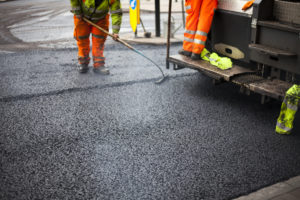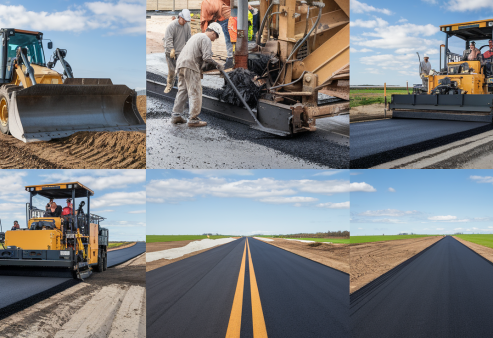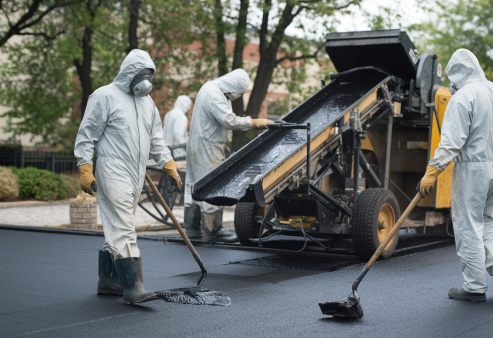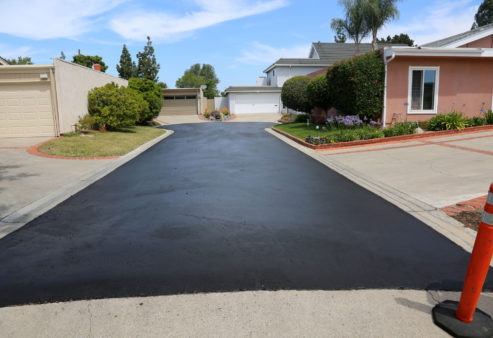New technologies in advanced materials and construction techniques allow the roads to have a higher level of durability. Solutions like polymer-modified asphalt and recycled materials have contributed to the production of roads that are more flexible, crack-resistant, and, in the long run, durable.
Warm Mix Asphalt makes it possible to lower production temperatures and, hence, lower emissions while being less energy-consuming without reducing the strength of the specifications. These innovations from TurnKey Asphalt save taxpayer dollars through less frequent maintenance while also contributing to green initiatives. Contact us today to reduce maintenance costs, support green initiatives, and pave the way for long-lasting infrastructure.
What is New Asphalt Technology?

These advancements in asphalt technology have revolutionized construction and maintenance work on roads. Along with them come newer solutions that can equally promise high performance with a sustainable, green touch. Warm Mix Asphalt (WMA) is one such example, as WMA can be manufactured under comparatively lower temperatures than Hot Mix Asphalt (HMA).
Fuel and greenhouse gas emissions are saved, and therefore it’s an environmentally friendly product. Reflective materials may be integrated within asphalt surfaces, providing increased visibility at night and ensuring all road users are safe.
Be it materials containing recycled materials, such as reclaimed asphalt pavement or recycled shingles, you are putting greener products on the market without sacrificing performance.
Smart paver high-tech, like using GPS and automated controls, guarantees exact application, while performance-graded binders react to climate and traffic demands. In concert, these improvements ought to provide greater safety while building longer-lasting, more reliable roadways.
How Does New Asphalt Technology Enhance Durability?
Thanks to technological improvements in asphalt, roads are reputedly more durable than ever. Such pavements are designed to resist harsh conditions and lessen maintenance needs whilst delivering longer service lives, all using integrated inventive materials and methodologies by engineers. Materials and methodology combine to reinforce asphalt technology.
-
Modified Binders Improve Flexibility
Asphalt mixed with stuff like SBS usually gets more elastic and doesn’t deform as easily. This new asphalt tech makes roads less likely to crack when the weather gets hot or cold.
Complicated testing, such as the Dynamic Shear Rheometer (DSR) provides more accurate forecasts of binder performance under cold conditions. This integrated approach is more time- and resource-efficient than the hauler’s road approach allowed under traditional regulations.
-
Polymer Additives Increase Strength
Adding polymers to asphalt mixes strengthens them at the molecular level. This makes the asphalt better at resisting ruts and wear, especially where there’s a bunch of heavy truck traffic. These binders create a tough surface, which is super helpful on busy roads like interstates and major freight routes.
-
Warm Mix Asphalt Reduces Cracking
Warm mix asphalt? It’s mixed and put down at cooler temps. This cuts down on gas use and pollution. Plus, it’s easier to work with when you’re laying it, so you get better compaction and fewer cracks later on.
-
High RAP Content Promotes Sustainability
Reclaimed Asphalt Pavement (RAP) is mixed into more new mixtures so that less virgin material is utilized and more pavements that exist are reused. It uses a similar toughness at a lower price and environmental cost.
-
Nanomaterials Enhance Performance
Adding stuff like nano-silica, thanks to nanotechnology, makes asphalt stronger and better at resisting water. This means roads don’t break down as fast from water damage or general wear and tear.
Future Trends in Asphalt Technology

Innovations in asphalt technology will bring a new standard of durability, efficiency, and sustainability in 2025 and beyond. Recycling is going to be front and center with 100% Recycled Asphalt Pavement (RAP) the norm, and in areas prone to flooding, the norm will be even greater.
Closed-loop systems will make on-site asphalt recycling easier, reducing emissions and expenses. Ultra-long-lasting mixes will benefit regions with unstable weather, and nano-asphalt will offer enhanced strength and flexibility for high-traffic roads such as highways and airports.
Smart roads that talk to drivers and cars through advanced technology will provide real-time traffic and condition updates. Self-healing asphalt and energy-harvesting pavements are on the verge of increased use.
Moreover, wireless charging integrated into roadways will turn infrastructure into dynamic systems that serve multiple purposes.
Creating the Best Driving Conditions With Asphalt
New asphalt technology is improving the way we approach road longevity. Thanks to new materials and more intelligent engineering, today’s roads are lasting longer and are more resilient to heavy traffic.
These innovations move the needle in saving time and money on future repairs while creating the best driving conditions possible for everyone. With innovations that vary from tougher mixes to green solutions, the future of asphalt is bright and intelligent.
If you’re interested in beginning with more resilient paving solutions, reach out to TurnKey Asphalt today to discover how these technologies can benefit you. Durable roads begin with better choices.








 By TurnKey Asphalt
By TurnKey Asphalt  Jul 10, 2025
Jul 10, 2025 







